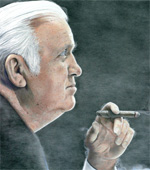Paul Hall (labor leader)
| Paul Hall | |
|---|---|

Second President of SIU
|
|
| Born | 1914 Inglenook, Alabama, US |
| Died | June 22, 1980 |
| Occupation | Trade union leader |
| Spouse(s) | Rose Hall |
| Website | http://www.seafarers.org |
Paul Hall (1914 – June 22, 1980) was an American labor leader from Inglenook in Jefferson County, Alabama. He was a founding member and president of the Seafarers International Union (SIU) from 1957 to 1980. He was the senior vice president of the AFL-CIO at the time of his death.
He started shipping as a teenager in the early 1930s, mostly as a wiper and Fireman/Watertender and Oiler (FOWT). He also earned a 2nd Engineer license, but never sailed under it.
1938 saw the founding of SIU and Paul Hall was a charter member. He made his presence felt immediately. He was a tough, hard-nosed union activist and his early waterfront battles left him with ugly knife scars on his arms and legs.
His first official post in the union was as patrolman in the port of Baltimore in 1944. He rapidly moved up to become port agent in New York and then Director of Organizing for the SIU Atlantic and Gulf District. Then in 1947, he became chief executive officer of SIU-Atlantic Gulf Lakes and Inland Water District, at the age of 32. He held this post until his death. Paul Hall led the SIU in the General strike of 1947 when seamen won unprecedented gains in wages and conditions. He also organized key breakthroughs for the union in bringing Isthmian Lines (with 125 ships) and Cities Service Tankers (a strongly anti-union company) under the SIU banner.
Through collective bargaining, he also established the Seafarers Welfare, Pension and Vacation Plans. By 1954, the SIU had aided with, as Paul used to say, "money, marbles and chalk" a total of 75 brother unions in strikes and organizing campaigns. These constant battles to help other unions earned Paul Hall the lifelong reputation of one who got things done and who could always be counted on for help no matter what the problem.
In 1957, Paul Hall became president of SIU-North America, succeeding the late Harry Lundeberg, a post he held until his death. In the same year, he became president of the AFL-CIO Maritime Trades Department. When Hall took over the Maritime Trades Department, it was a struggling organization made up of only six small unions. He built it into the most active and effective political force in the family of the trade union movement. At his death, it comprised 43 national and international unions representing nearly 8 million American workers.
...
Wikipedia
